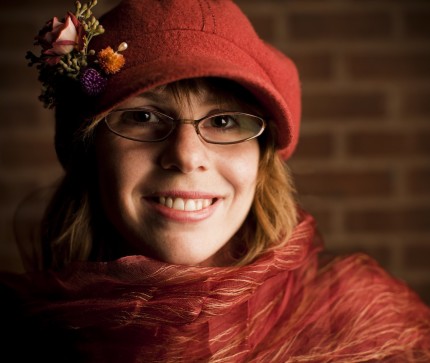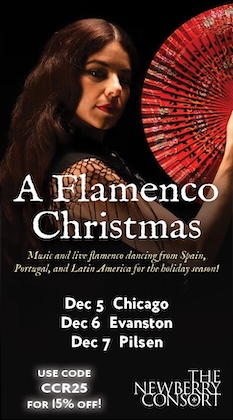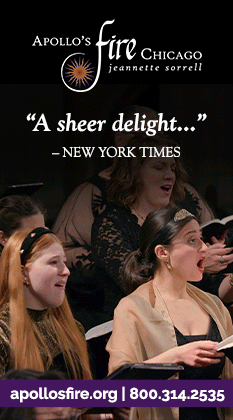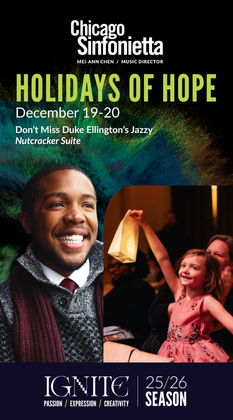Anna Clyne’s “Night Ferry” set to sail after a long creative voyage

For over a century the Fine Arts building on S. Michigan Avenue has been a homebase for Chicago musicians, and the dark, atmospheric venue remains so today. Walking through the halls one can heard fitful fragments of music from behind closed doors, with a cello sounding from one room and a mezzo-soprano practicing scales in another.
In one small studio in the building, composer Anna Clyne greets her guest and offers coffee or tea before settling on a piano bench to talk about the inspiration for Night Ferry. The new orchestral work by the Chicago Symphony Orchestra’s co-composer in residence will be premiered by Riccardo Muti and the CSO on Thursday night.
Most of the 31-year-old Englishwoman’s music to date has been written for smaller ensembles. She has only written one previous work for orchestra, <<rewind>>, which was scheduled to be performed last season and was postponed due to Muti’s illness.
So, this week’s world premiere of Night Ferry will mark the belated debut of Clyne’s music on a CSO subscription concert. For her the creative process usually goes fluently, but the composer found writing a 20-minute work for large forces a much greater challenge.
“The orchestra is such a beast,” she said. “I mean, it’s like a massive elephant in terms of this mass of people and sound. It’s a little overwhelming because you can do anything. The only limit really is your imagination.”
The inspiration for Night Ferry stems from two sources: Samuel Taylor Coleridge’s epic poem The Rime of the Ancient Marriner and a suggestion by Riccardo Muti that Clyne look through music of Schubert, two of whose works will frame her music on the same program.
She decided to research Schubert, not through his music but through his short, driven and hectic life. Clyne drew particular inspiration from contemporary psychological writing about Schubert’s fragile psyche.
“I found that he suffered from an illness called cyclothemia, which is a form of manic depression with rapid cycling,” she said. “His friends reported that it had a very dramatic impact on his life. He’d go from violent rages to the complete opposite.” Clyne also researched other artists and writers who had similar emotional issues such as Lord Byron, Virginia Woolf and Randall Jarrell.
Cast in a single 20-minute movement, Night Ferry is Clyne’s largest effort to date. To get a handle on the composing and make it less daunting, she decided to break the work into seven three-minute sections using visual cues to spark her creativity. “I think very visually and I thought, ‘I wonder what it would be like to try to express that through imagery as well as music?’”
On one wall of her studio is a large, long scroll of paper that is essentially a timeline of the piece. It includes her scribbled quotations from Coleridge and other sources as well as whirling painted images of her own to use as a creative device for translating the visual inspiration into sound.
She points to the violent, roiling waves on the first page. “This is what I had when I started the piece—just this big, turbulent dark image.” Elsewhere she indicates a line from Jarrell’s poem 90 North: “I wrung from the darkness—that the darkness flung me” and “The darkness from the darkness. Pain comes from the darkness. And we call it wisdom. It is pain.”
The title of the composition stems from an excerpt from Seamus Heaney’s Elegy for Robert Lowell.
You were our Night Ferry
thudding in a big sea,
the whole craft ringing
with an armourer’s music
the course set wilfully across
the ungovernable and dangerous.
So Night Ferry depicts dark nocturnal voyages, those within our psyches as well as in the world without. “It’s about the turbulence,” says Clyne. “Spiritual turbulence, creativity and turbulence of the mind, as well as the nature parallels from Coleridge.”
Night Ferry is scored for triple winds, four horns, strings and a large percussion battery including “small Tibetan singing bowls.” In her longest orchestral work to date, Clyne says she tried to do several things she’s never attempted before.
For instance, she has created an unplugged acoustical counterpart to the electronic stereo panning she has utilized in the past. “I have three bass drums, one in the center, one very far to the left and the third very far to the right. And I have these bass drum rolls, which should slowly move and then come back. I don’t know if it’s going to work! We’ll see.”
The composer said it was a blessing that Muti suggested she look more closely into Schubert. “Maestro Muti really gave me the kernel for the piece,” says Clyne. “Had I not researched Schubert’s life and his personal life, I would never have come upon this.”
The CSO music director suggested a few minor changes after Clyne showed him a short unorchestrated score and had more, very specific questions in conversations they had over Christmas.
“It was very clear to me that he’s really studying it,” she said. “I never had an experience like this where a conductor has given such care to a score. It’s a real honor to be working with someone not only with such talent but with such a deep connection to music and such a deep sense of soul. That’s rare to find.”
—————
Most local performances of Clyne’s music have taken place at the Harris Theater under the aegis of the CSO’s MusicNOW series, which she curates with fellow composer in residence Mason Bates. Several Clyne works have been performed there including, most recently, Within Her Arms, a deeply moving yet unsentimental work for 15 strings written in the wake of her mother’s death in 2008.
“I got a call on a Friday lunchtime that she had passed away that morning,” she recalls. “It was totally unexpected. To lose someone so tragically and so suddenly….In that moment my only way to really relate to how I was feeling was to write music. For me music is very much an emotive thing.”
She has recently completed a ballet in collaboration with choreographer Nicolo Fonte, which will be premiered by Houston Ballet in May. In this case, she had nearly finished the score when she decided it wasn’t working and started over again from scratch. “The hardest thing in composing,” she said, “is to know when to bail.”
The second time around Clyne wrote an entirely new score she was much happier with, completing the ballet in just three days. “I don’t know how the hell I did it,” she says. “It just flowed.”
—————-
Anna Clyne was born in London and grew up in Abingdon, a working-class area outside Oxford. Neither parent was particularly musical though her father would play the guitar in a maladroit fashion. She taught herself piano, later taking up the cello. She began writing music “for fun” in her teens but didn’t have any formal training until she was 20.
“I had all these ideas but I didn’t have the tools to implement them,” she said. “It was a blessing in disguise really. Because I didn’t get the training until later it allowed me to develop my music personally and really explore sound. It wasn’t a matter of imitating others.”
Clyne has quickly adapted to life in Chicago, and enjoys the city’s wide array of ethnic restaurants as well as hunting in local thrift shops. Lately she’s been taking Irish fiddle classes and can be found listening to Irish folk music over a pint at local clubs.
Not every Chicago experience has been positive, however. In the brief time she’s lived here, she’s been pick-pocketed twice. “I have to take my hat off to them,” she says with wry British understatement. “It was very smooth. I had no idea it was gone.”
Her first CD, Blue Moth will be released Feb. 28 on the Tzadik label. And with her residency renewed for another two years along with that of her colleague Bates, Clyne will be in the city to stay for a bit longer. After that she is open as to where she might land.
“The thing with being a composer is that you can really be anywhere,” she said. “As long as it’s somewhere where you’re happy and you have good friends, and the cost of living is reasonable.”
She confesses to being “excited and quite nervous” about this week’s rehearsals and performances of Night Ferry. “It’s very weird living with this piece in your imagination for so long,” she says. “Being a composer is a complete juxtaposition. You spend a life of solitude writing a piece and then suddenly it’s the complete opposite and you’re with a hundred musicians. It’s quite nice but it’s strange.”
Still no matter what the result this week, the composer remains cheerfully optimistic.
“Even if it’s a disaster,” she says, “I’ll learn how not to make a disaster next time.”
Riccardo Muti and the Chicago Symphony Orchestra perform Anna Clyne’s Night Ferry 8 p.m. Thursday along with Schubert’s Symphony No. 9 and the Entr’acte No. 3 from Rosamunde. The program will be repeated 1:30 p.m. Friday and 8 p.m. Saturday. cso.org; 312-294-3000.
Posted in Articles





